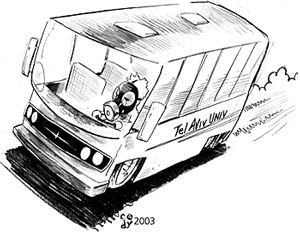
Illustration by Cody Angell
|
By David Halperin
Arizona Daily Wildcat
Thursday March 27, 2003
On the morning of Wednesday, March 19, at around 1 a.m. Arizona time, I boarded a bus, gas mask in hand, with 17 other overseas students at Tel Aviv University, and headed for the middle of nowhere, indefinitely.
We all knew before coming to Israel of the possibility of a war in Iraq, and as the war became imminent, we knew it was only a matter of time before we received the request from the university staff to leave the dormitories.
Those who chose not to go on the university-sponsored trip stayed with family and friends, and three left the country at their parents' request.
The night before we all left the dorms was the Jewish holiday of Purim, a festive holiday known for its parties in which everyone
dresses up, similar to Halloween. While most Israelis were celebrating the holiday, as in any other year, we were packing for our indefinite stay in the south.
After about a four-hour bus ride, made longer by driving around the West Bank, we arrived to a place called Mitzoqe Dragot. A kind of summer camp-like motel for passing hikers only a few miles from the nearest checkpoint to enter the West Bank and set overlooking the Dead Sea and the desert mountains of Jordan, Mitzoqe Dragot is truly the middle of nowhere.
Later that night the government ordered all Israeli citizens to open their gas mask kits, so that if needed they could be put on as soon as possible without taking time to open the box. We all gathered outside our rooms as a university staff member opened our kits, gave a last second lesson on putting on the masks and filter, and showed us our prepared shelter nearby. We were told if the siren sounded we had a minute and a half to run to the shelter with our masks before it was locked.
About a half an hour later a car alarm sounded nearby, sending several of the girls on the program to run out of their rooms with gas masks in hand · false alarm.
Thankfully, we would never hear the siren, and we would spend our time in Mitzoke Dragot occasionally going hiking when not huddled around the single television, watching the news of the war and protests in the neighboring countries.
Three days later we returned to Tel Aviv. Though the threat to Israel was never great, and since has been largely diminished, I could still hear the siren at any second. Still, life continues as normal here. This war is largely supported by an Israeli public who view Saddam Hussein as yet another enemy calling for the state of Israel to be driven into the sea. Although I did see a war protest in front of the Tel Aviv University campus this past weekend, with only about 30 people showing up. You can still see a few people carrying their gas masks with them everywhere they go, but overall Israel continues despite fear. Sure, the dorms here were emptied for a few days, families prepared their sealed rooms, many school children stayed home from school, and some Israelis chose to travel elsewhere.
But as one of my teachers put it, this war was just a good excuse for many Israelis to go skiing in Europe for a week.
I spoke with an Israeli friend at the beginning of the war and she told me she didn't even remember where she put her gas mask, and that she was getting ready to go to a concert that night. Meanwhile my aunt in Colorado told me she was one of many in the states stockpiling water and preparing for the worst.
It may be that Israelis are used to preparing for the worst, or maybe it's that in this post-9/11 world many Americans have been simply overcome with fear, and just cannot fathom how to react to another hate-filled attack on the United States.
From Arizona it is hard to conceive just how life goes on here, in a place so accustomed to threats. It's as if there was a war waging in Dallas, and Tucson was on terror code level black, and mostly, everyone seems fine.
David Halperin is a UA political science and Judaic studies senior studying at Tel Aviv University this semester. He can be reached at letters@wildcat.arizona.edu.

